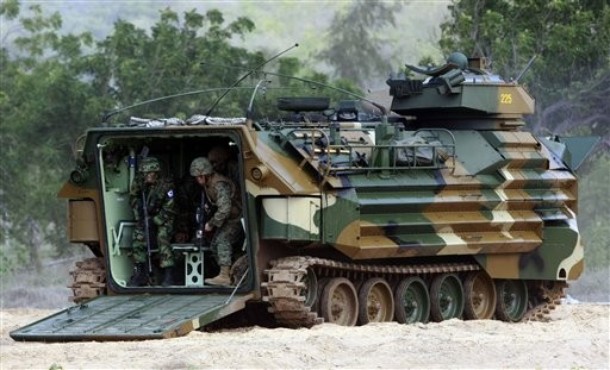
As I understand the domestic debate around spending programs, the conservative position is typically not that social programs should be expanded to meet the needs of more and more people, but that their scope be dialed back to improve the government's balance sheet. When confronted with the dynamic of "spend more to do more" vs. "do less and spend less" the conservative position is to "do less and spend less." (That's the theory at least, it didn't quite work that way when Republicans controlled the purse strings.)
But when it comes to the largest government bureaucracy, up becomes down. Despite the fact that the Obama administration is proposing in its newest budget to increase defense spending, conservatives are insisting (with good reason) that it is simply not enough to meet the military's current and future needs. Nation building is expensive, after all. As Michael O'Hanlon noted, the U.S. has defense treaties or obligations with nearly 70 countries. Defending all those countries isn't cheap. But rather than argue that the U.S. should take a harder look at its defense priorities and "do less to spend less" conservatives have embraced big government. Here's the Heritage Foundation defense analyst Mackenzie Eaglen:
Ultimately, the persistent underfunding of defense plans cannot be solved without a sustained commitment by Congress to increase the core defense budget at a rate that takes defense cost inflation, which outpaces the general economy, into account. Adequately funding Pentagon plans would stop the bleeding in many defense modernization programs. The steady erosion of modernization plans only makes it more expensive to purchase new equipment when the older systems have worn out.To address these concerns, the Congressional Budget Resolution should grow the defense budget at least 5 percent above inflation in FY 2011 and beyond in order to address the Pentagon's underfunded plans and remedy many cuts from last year's inadequate defense budget. This would allow more robust procurement, increased build rates, greater economies of scale, enhanced contractor competition, and a healthier defense industrial base.
But why not produce defense savings by making changes in our military posture, reducing the load on the military by eschewing manpower intensive counter-insurgencies? Eaglen notes that manpower is one of the largest drivers in defense spending. If we continue to use the military to police Baghdad and Kabul (and possibly Yemen and Somalia) not to mention all its other deployments, the costs are going to outpace our ability to pay for them.
Drones, good intelligence collection and a change in our foreign policy with respect to the Middle East would reap savings which could be directed toward sustaining a highly modernized military force capable of deterring major nation state rivals.
(AP Photo)











